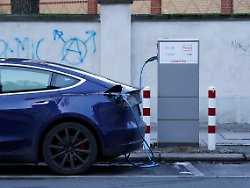Pressure on car manufacturers is growing
Electric cars should become greener
04/09/2022, 09:47 am
There is still a long way to go before e-car manufacturers ban environmentally harmful materials from their supply chains. It’s not just the construction of the battery that causes headaches for developers. This creates new opportunities for companies that do their business with sustainable raw materials.
An electric vehicle should be significantly more environmentally friendly than a conventional petrol engine, right? Well, the reality is a bit more complicated. From motor magnets with toxic by-products to batteries that require vast amounts of fossil-based electricity to produce, EV makers still face a number of challenges in their quest to remove polluting materials from supply chains.
It’s not just the energy-intensive construction of car batteries that causes headaches for developers. The material that is used is also considered to be unsustainable – especially the so-called rare earths, which often come from China, where they are produced with polluting chemicals. Pressure from regulators and investors is forcing automakers to rethink. This creates opportunities for companies that sense business from the demand for sustainable raw materials and processes. For example, the British engine manufacturer Advanced Electric Machines (AEM), which works with the Volkswagen luxury brand Bentley, among others, to develop electric motors without rare earth metals.
The main problem remains carbon-intensive manufacturing
“Our customers need cost-effective and sustainable ways to replace internal combustion engines without having to fill their cars with tons of this nasty rare earth stuff,” says James Widmer, head of the English engine manufacturer Advanced Electric Machines (AEM), the development the point. Other companies like Addionics from Israel are looking at the battery and how to make it cleaner. Investors are paying more attention to environmental aspects, says Addionics boss Moshiel Biton. “But that’s nothing compared to what’s to come.” The so-called ESG goals are playing an increasingly important role for investors.
Companies should not only make a profit, but also take environmental protection (environment), social aspects (social) and responsible corporate management (governance) into account. Makram Azar, head of London-based investment firm Full Circle Capital, says raising capital is easier for those who tick all the ESG boxes. There are not enough ESG-compliant companies for the large sums that asset managers have ready for such investments. For example, Full Circle has invested in British startup Britishvolt. The company is currently building a battery system for electric vehicles that will be operated exclusively with renewable energy.
Car manufacturers are not fast enough
The main problem with electric cars remains their carbon-intensive production: they have to drive thousands of miles before they are less polluting than their gas-guzzling counterparts. In particular, the production of batteries requires a lot of energy because work is carried out at high temperatures and a lot of aluminum is used. For car manufacturers, this means also taking the supply chain into account. “We only enter into new business with suppliers who have a net-zero emissions plan,” explains Andy Palmer, CEO of British electric car maker Switch Mobility, which belongs to Indian commercial vehicle group Ashok.
Automakers are moving in the right direction, says Costa Caldis, who is responsible for operations at supply chain specialist SAFE. But this is not fast enough. “The stakeholders are demanding transparency in the supply chain and not just explanations.” The reduction of carbon emissions in the supply chain is an important part of BMW’s corporate strategy, emphasizes Thomas Becker, who is responsible for sustainability at the Munich company. BMW has agreed with all of its battery suppliers and many of its steel and aluminum suppliers that their materials can only be made with renewable energy, Becker said at a conference in London in March.
Pressure on car manufacturers continues to rise
According to BMW, the CO2 footprint was twelve tons per vehicle in 2019. With the new plans by BMW to reduce emissions, this value should be reduced to nine tons by 2030. Previous sustainability efforts by companies are often derided as vague or as “greenwashing” – i.e. pure PR measures. Switch, for example, buys carbon credits to offset the carbon used in the manufacture of metal components, Palmer says.
However, these certificates are criticized by activists because, from their point of view, the transnational emissions market leads to a fundamental antagonism between certificate trading and national climate protection measures. If greenhouse gas emissions become a tradable commodity, pollution will be legitimized to a certain extent: those who can afford it can continue to “sin” and simply “greenwash” themselves with certificates. The pressure on car manufacturers is therefore likely to continue to rise.
